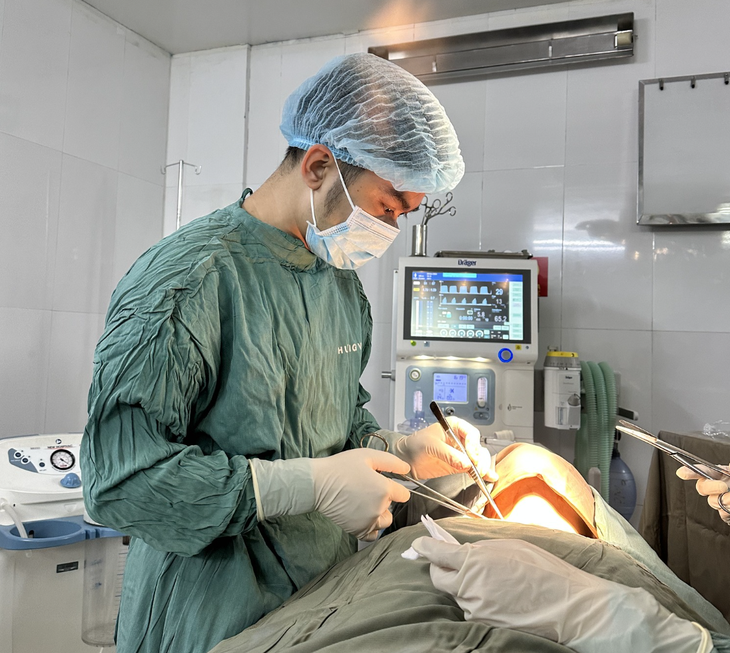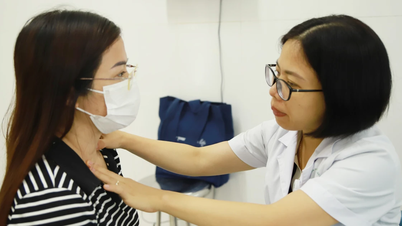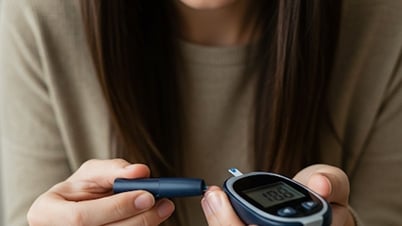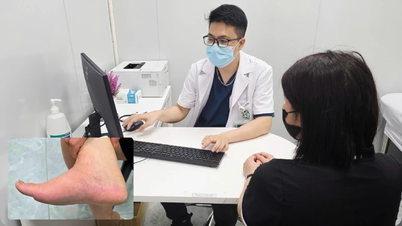
Doctor Nguyen Xuan Tuan treats a patient - Photo: BSCC
"No malignant cells found" is reassuring?
Sharing about this issue, Dr. Nguyen Xuan Tuan, a resident physician specializing in oncology, said that this is a common question he hears after examining patients.
"I usually have to answer patients very carefully because the FNA result showing no malignant cells does not mean absolute safety. Fine needle aspiration (FNA) is a valuable diagnostic method to help determine whether a thyroid nodule contains malignant cells or not.
However, a result of “no malignant cells found” must be understood in the context of the Bethesda classification. For example, if the result is Bethesda II - Benign, the accuracy rate is high, but there is still about a 2–5% risk of false negative, meaning there is still a possibility of cancer even though the result is “benign”.
In addition, it is even more dangerous if the result is Bethesda I – insufficient sample. This is the group where the specimen does not meet the diagnostic criteria, possibly due to incorrect aspiration, aspiration of necrotic tissue, or the lesion is too small to be able to conclude whether it is benign or malignant.
In other words, Bethesda I is not "no malignant cells", but "nothing to evaluate". If the patient or doctor is subjective, thinking "just poked, nothing bad found", and then follows up laxly, then a potential malignant lesion can be missed", Dr. Tuan explained.
In fact, Dr. Tuan shared that he had encountered such cases, the result of the puncture was "not enough sample" but did not puncture again. 1-2 years later, the nodule grew larger, started to compress, ultrasound showed TIRADS 5, puncture again revealed papillary cancer.
"It is important that FNA is only one step in the diagnosis and must be understood correctly, according to the correct classification. After benign or insufficient FNA, regular ultrasound follow-up is still needed. Repeat puncture if the nodule is large, the ultrasound features are suspicious, or change rapidly. Re-evaluate the entire clinical picture - not just "look at the paper results".
"Aspiration is to assist the doctor in making decisions, not to 'give peace of mind'. True peace of mind comes when proper monitoring is performed, no omissions are made, and any abnormalities are detected promptly," said Dr. Tuan.
Is thyroid cancer "scary"?
Doctor Tuan has met many patients who, after hearing the four words "thyroid cancer", lost all blood on their faces and looked at the doctor in confusion.
"It's understandable. The word "cancer" carries with it a lot of fear: fear of surgery, fear of metastasis, fear of being hospitalized for a long time, fear of having to live with the disease for the rest of your life.
But if I had to choose the "least scary" type of cancer, thyroid cancer, especially papillary and follicular types, would be the top candidate," Dr. Tuan shared.
This expert explains first , differentiated thyroid cancer (papillary, follicular) has an extremely good prognosis. If detected and treated properly, especially with initial radical surgery, the chance of recovery is very high.
Major studies from the US, Europe and data from Vietnam all show that the 10-year survival rate for papillary cancer can be up to >97%, especially in young people under 55 years old.
Second , proper and timely treatment helps patients have a completely normal quality of life. Many people after thyroid surgery still go to work, go out, and live completely normally as before. No chemicals, no long hospital stays, no exhaustion.
Third , if the disease is still in the early stages, the doctor may prescribe surgery to remove the thyroid lobe or the entire thyroid gland, depending on the case. Then, based on the risk stratification and the histopathological results, the doctor will consider radioactive iodine treatment, not everyone has to take iodine as many people mistakenly believe.
"However, just because it is "easy to cure" does not mean you can be subjective. The most important condition is to be diagnosed and treated by a specialist.
So if you or a loved one has just been diagnosed with thyroid cancer, don't panic. Start by seeing a thyroid specialist, ask carefully about the type of cancer you have, the level of risk, and a clear treatment plan," Dr. Tuan recommends.
Source: https://tuoitre.vn/nhan-tuyen-giap-lanh-tinh-co-phai-da-an-tam-20250929171310189.htm



![[Photo] Prime Minister Pham Minh Chinh chairs a meeting of the Government Standing Committee on overcoming the consequences of natural disasters after storm No. 11](https://vphoto.vietnam.vn/thumb/1200x675/vietnam/resource/IMAGE/2025/10/09/1759997894015_dsc-0591-jpg.webp)



![[Photo] Prime Minister Pham Minh Chinh chairs the Conference to deploy the National Target Program on Drug Prevention and Control until 2030](https://vphoto.vietnam.vn/thumb/1200x675/vietnam/resource/IMAGE/2025/10/09/1759990393779_dsc-0495-jpg.webp)



























































































Comment (0)